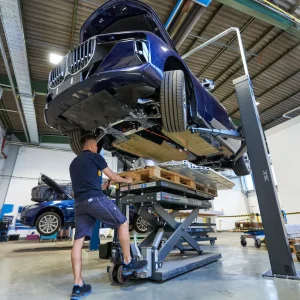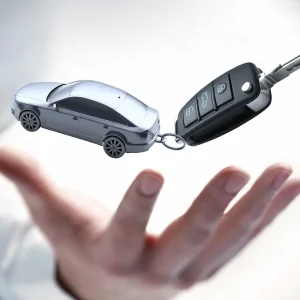The rise of the user-chooser is focusing the efforts of manufacturers on those fleet customers who are able to pick their own car, and figuring out how to appeal to their tastes.
Current SMMT figures show fleet and business registrations accounted for 55% of all registrations last year, underlining the importance of the fleet sector in general. But with CO2 and BIK considerations becoming even more prevalent for these customers, manufacturers have to adapt their cars to ensure they’re meeting the changing needs of the user-chooser.
“Manufacturers have begun focusing on the needs of fleet customers and have been producing ‘business editions’ in the hope of making it onto user-chooser company car lists,” explains Jayson Whittington, chief car editor at vehicle valuations company, Glass’s.
A new focus
Skoda, in particular, is one manufacturer that has set its sights on the fleet customer, recently introducing a new business-specific trim. Henry Williams, head of fleet at Skoda, tells BusinessCar that fleets, whether big or small, are looking for higher spec that offers greater comfort, tech and safety features, yet also fits in their budget. “We worked with existing customers and residual-value advisers from the guides and leasing companies to develop our SE Technology trim, to offer customers excellent value for money,” he says.
Skoda’s SE Technology trim offers additional features such as Bluetooth, sat-nav and cruise control, to make it the obvious choice for business owners and user-choosers who are faced with an extensive list of vehicles.
“The majority of fleet customers that dealers interact with will live in the local vicinity.”
The trim, which is available on the new Karoq, offers features above the consumer-focused SE trim at no extra cost to the customer. Williams says, “Along with offering a highly desirable level of specification to the driver, the business trim also keeps driver taxation to a minimum, which is becoming vital to user-chooser customers.”
By keeping the P11D cost of the vehicle low, Skoda enhances its fleet appeal. “We aim to be a valued business partner for our fleet customers, and the introduction of the SE Tech trim means we can offer businesses value for money without compromising on quality; that is the key to our success in the sector,” says Williams.
Business trims are a growing trend in the automotive industry, as company owners to user-choosers are looking for the best value without compromising on level of specification. “Ultimately, we want business customers to make the right choice, and the better our offering in the market, the more compelling our proposition is,” he says.

Skoda is not alone in this, and Williams admits he has seen an increasing number of manufacturers launch business trims. “It’s highly beneficial for customers to have a trim level specific for company car drivers that makes narrowing down choice much easier and helps save time,” he says. “By packaging a trim level with all of the equipment needed and the associated residual-value improvement, it is a winning situation for the customer and driver.”
Hyundai has a number of models in its range that appeal to business drivers, notably its BIK-friendly powertrains, generous specification and comfortable, spacious cabins, explains Michael Stewart, Hyundai UK’s fleet director.
The Hyundai Ioniq is unique in offering separate hybrid, fully electric and plug-in hybrid powertrains within one body type. It enables business car decision-makers to specify the Ioniq that best meets the needs of their drivers, depending on travel frequency and typical distances covered. “The model enables business buyers to benefit from the lowest levels of company car tax, and is generously specified to provide all the equipment that fleet drivers demand,” says Stewart.

While business and retail drivers demand similar characteristics from their vehicles, Stewart explains that fleet buyers in particular look for strong connectivity to remain in touch with colleagues while on the move. “Also, comfortable, multi-adjustable seating is key for those who cover long distances. Finally, low emissions – and thus low company car tax – is a key motivator. All of these are areas in which Hyundai’s vehicles excel,” he says.
Despite drawing attention to these models, Hyundai does not have any fleet-specific versions, interestingly. “Hyundai considers business buyers at the outset when designing and specifying any new model,” Steward explains. “Therefore, all Hyundai vehicles are well specified, well priced, and highly efficient. For this reason, fleet-specific versions are not necessary – a benefit to all buyers with simple model line-ups and straightforward choices between specification levels.”
Simplicity is key
Seat’s approach to user-chooser customers is unique and the manufacturer has focused on making choosing and buying a vehicle for its fleet customers as simple as possible. “At its core, we want to be offering great products and making life simpler for customers. For instance, metallic paint has typically been offered as an additional cost option; however, more than 90% of the time, customers pay for metallic paint, and from a fleet perspective, leasing companies mandate it. So for company cars, it’s close to 100% take-up. We’ve reviewed all our options through this lens,” says Peter McDonald, Seat’s fleet boss.
Rather than frustrate customers with multiple steps in the configuration process, the manufacturer wants to make it easier, and standardise the right specification. McDonald says this will be particularly useful when we enter a WLTP emissions-testing environment, and options affect the price and CO2 calculations. “This simpler approach will make it significantly easier for the driver, and the corporate and leasing company to work with us. It also means we optimise our future used-car stock by having better-specified vehicles attracting higher prices at auction, because they all have the specification the customer wants.”
McDonald explains Seat’s view is that it’s important to offer fleet customers a trim with lower list prices and higher specification, but that the manufacturer doesn’t isolate these trims just to fleet. For instance, the Leon SE Dynamic is optimised for fleet, but is also available to retail customers.
McDonald draws attention to the importance of fleet to Seat’s success. “We believe it’s important to consider customer requirements in the product management process and while retail – which carries a 43% market weight – receives the main focus, true fleet represents a significant 22% weight itself, and needs to be at the forefront of our development process,”
he says.
Changing focus on service
Despite the progress towards catering for the user-chooser customer, Whittington says many of the user-choosers who visit dealer showrooms for information and test drives will have no choice when it comes to the ultimate source of the car. “As a consequence, this can deter salespeople from investing the right amount of time with the potential customer,” he explains.
In order to effectively support business customers, Skoda’s Williams says there needs to be a focus on how manufacturers facilitate relationships through their retailer networks. Skoda, in particular, has taken steps to enhance its local business development manager (LBDM) programme to support its retailers.

“Through this, we provide a tailored service to ensure fleet customers receive the best value on vehicle costs, finance options and any service packages,” he says. “Our LBDMs work alongside the Skoda retailer to consult with customers, to show them how they can optimise their fleet efficiency by saving on factors such as taxation and running costs. It’s a one-on-one approach that is available to customers every day to save them time and money.”
Hyundai says it takes great pride in the high standard of service it offers business customers. “Several programmes are in place to ensure owning a Hyundai vehicle is easy, rewarding and stress-free,” says Stewart. “For example, Hyundai’s industry-leading Fleet Aftersales Charter ensures a consistently outstanding experience for fleet customers.” The charter sets out transparent pricing and processes, and aims to make aftersales services easier to use, while helping to reduce the cost of ownership for fleets.
Hyundai also has a dedicated fleet support team, available via phone or email, and its new 360 Workshop Automation makes fleet maintenance an easy and efficient process for all fleet customers. At the core of the programme is what it claims is the industry’s quickest online service-booking system, which requires no more than six steps and takes just ten seconds to complete.
Stewart says Hyundai prides itself on building a long-term partnership with its business customers, offering a consultative approach to sales and aftersales processes. “This, and the company’s focus on innovation in products and services, is driving Hyundai’s growing reputation and market share within the highly competitive fleet sector,” he says.
Seat’s McDonald maintains that limiting products to fleet shouldn’t detract from the customer experience. “Not only it is unlikely that dealer sales staff will have great awareness of a fleet-only product, or have a demonstrator available, but customers may also find it difficult to receive product literature, configure the vehicle online or find an independent journalist review. Our preference is to have model derivatives in the range that deliver the core fleet benefits of a higher specification and a lower list price, but also be channel-agnostic in our offer,” he says.
The manufacturer has recently introduced a four-day fleet test drive programme in dealerships, which offers potential customers the chance to take a car home for a longer period than a usual test drive. “We see this as a great solution for user-chooser customers, it can be a key tool to enable our dealer network to offer customers – enhancing their customer offering,” McDonald says.
A significant market
McDonald says the market for fleet drivers, and therefore user-chooser customers, is so significant that it can no longer be ignored.
“The majority of fleet customers that dealers interact with will live in the local vicinity, and the dealer will want to maintain a strong reputation and sell products and services directly related to fleet,” he says. “They may also identify retail sales opportunities in the family, so that the benefits extend beyond fleet.”
Whittington agrees. “As manufacturers improve their online user experience, I can see the service offered to user-chooser and business customers growing,” he says. “Many online solutions are already able to give all the information that a business user needs to make a decision in a very straightforward way, including arranging a test drive.”





